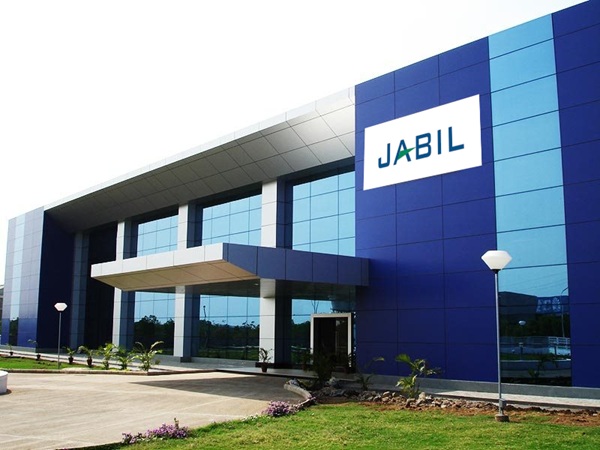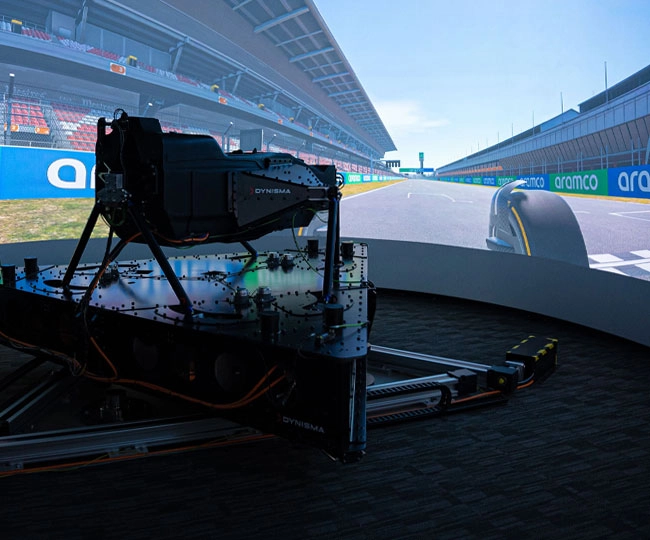1. British F1 racing simulator secures €10.7M export deal
Bristol-based Dynisma, a cutting-edge racing simulator company trusted by Formula 1 giants Ferrari and McLaren, has landed a €10.7 million export contract, marking a major milestone in its global expansion.
Founded in 2017 by former F1 driving simulation engineer Ash Warne, Dynisma has rapidly become a leader in high-fidelity motion simulation technology. The company’s simulators are renowned for their ultra-low latency and high bandwidth, offering an unmatched level of realism for motorsport teams and automotive manufacturers alike.
The newly secured contract, backed by UK Export Finance (UKEF) and NatWest, will see Dynisma deliver its advanced simulation systems to an undisclosed European client. The deal was facilitated through a €3 million surety bond issued by NatWest and guaranteed by UKEF’s Bond Support Scheme
“This support from UKEF and NatWest has played an important part in helping us unlock new global opportunities,” said Dynisma CEO Ash Warne. “It reflects the strength of our technology, our culture, and our people. We’re proud to be flying the flag for British innovation on a global stage.”
Dynisma’s simulators are already in use by top-tier motorsport teams including Ferrari and McLaren, and are considered essential tools for vehicle development and performance optimisation. The systems allow teams to virtually test and refine vehicles across the entire product lifecycle, significantly reducing the need for physical prototypes and track testing.
The company recently expanded its operations with a new 20,000 sq ft campus in Bristol, creating over 65 new jobs in the past year alone. This growth reflects the increasing demand for simulation technology not only in motorsport but also in broader automotive and industrial applications.
Gareth Thomas, UK Minister for Exports, praised the company’s success: “Dynisma is a fantastic example of a successful British business that has gone from strength to strength through exporting. UKEF’s support enables Dynisma to unlock valuable new financing, which has opened up a new chapter for the company and helped to create new local skilled jobs.”
As Dynisma continues to innovate and expand, its role in shaping the future of automotive simulation and motorsport performance is only set to grow.
2. $500m manufacturing site for North Carolina

Granite Quarry, NC – July 2025 — Jabil Inc., a global leader in engineering, supply chain, and manufacturing solutions, has announced a major expansion in North Carolina with the development of a new advanced manufacturing facility in Rowan County. The project represents a $500 million investment and is expected to create 1,181 new full-time jobs over the next five years.
The new facility will be located in the former Gildan building at Granite Industrial Park in Granite Quarry. It will support the growing demand for cloud and AI data center infrastructure, a sector experiencing rapid growth due to the increasing need for complex AI hardware, advanced networking, and innovative cooling solutions.
“This expansion underscores our commitment to scaling capabilities that meet the evolving needs of our data center customers,” said Matt Crowley, Executive Vice President of Global Business Units at Jabil. “North Carolina’s skilled workforce and business-friendly environment make it an ideal location for this next phase of growth.”
This marks Jabil’s fourth site in North Carolina, joining existing operations in Asheville, Hendersonville, and Mebane. The company, headquartered in St. Petersburg, Florida, operates in over 25 countries and employs more than 140,000 people globally.
Governor Josh Stein praised the investment, stating, “We welcome Jabil’s expansion and are committed to supporting the largest manufacturing workforce in the Southeast. This project will have a transformative impact on Rowan County and the broader region.”
The state’s Economic Investment Committee approved a Job Development Investment Grant (JDIG) to support the project. Over its 12-year term, the initiative is projected to grow North Carolina’s economy by $3.2 billion, with a potential reimbursement of up to $11.25 million to Jabil, contingent on performance metrics being met.
Local leaders also celebrated the announcement. “This is a major economic development win for Rowan County,” said Rod Crider, President of the Rowan Economic Development Council. “Repurposing a vacant facility for cutting-edge manufacturing is a powerful signal of our region’s momentum and potential.”
Operations at the new facility are expected to begin in mid-2026.
3. London and Northern Ireland Lead UK in Attracting Foreign Investment

London and Northern Ireland have emerged as the top-performing regions in the UK’s latest Inward Investment Regional Competitiveness Index, showcasing their exceptional ability to attract foreign direct investment (FDI) relative to their economic size.
London: The UK’s Investment Powerhouse
London continues to dominate the UK’s foreign investment landscape. With a competitiveness score of 1.69, the capital attracts 1.69 times its fair share of national greenfield FDI projects based on its economic output. Although London accounts for 23.3% of the UK’s GDP, it receives a staggering 39.4% of the country’s inward greenfield FDI.
In 2022 alone, London hosted 411 international company expansions, ranking it as the third-largest FDI recipient city globally, behind only Dubai and Singapore. Major investments include a $552 million life sciences facility at Canary Wharf and a £6.5 million IT hub by India-based Mphasis, expected to create 700 new jobs.
Northern Ireland: Small Region, Big Impact
Northern Ireland, the UK’s smallest region by population and GDP, achieved a competitiveness score of 1.64, placing it just behind London. Despite its size, Northern Ireland attracted 39 greenfield FDI projects in 2022, outperforming expectations and demonstrating strategic appeal.
Key source markets for Northern Ireland include the United States and Ireland, which together accounted for 56% of inbound investments. Notable projects include:
- Insider Inc. establishing a tech and product hub in Belfast, creating 50 jobs.
- Harness, a US-based software company, opening an engineering centre with plans to generate 80 jobs over three years.
Scotland and the Broader UK Picture
Scotland also performed well, with a score of 1.23, indicating it attracts more FDI than its GDP share would suggest. However, most other UK regions scored below one, meaning they receive less FDI than expected based on their economic size.
Conclusion
The success of London and Northern Ireland in the 2025 UK Inward Investment Regional Competitiveness Index highlights the importance of strategic economic planning, global connectivity, and regional innovation. These regions set a benchmark for others aiming to enhance their attractiveness to international investors.
4. Swiss-Norway group and South America Mercosur sign free trade agreement

Javier Milei President of Argentina
Buenos Aires, July 2025 — After nearly a decade of negotiations, the European Free Trade Association (EFTA)—comprising Switzerland, Norway, Iceland, and Liechtenstein—has finalised a landmark free trade agreement with Mercosur, South America’s largest trade bloc, which includes Argentina, Brazil, Paraguay, and Uruguay.
A Decade in the Making
The agreement was officially concluded during the Mercosur Summit held in Buenos Aires on July 2, 2025. This comprehensive and broad-based deal marks a significant milestone in global trade, creating a free trade zone encompassing nearly 300 million people and a combined GDP of over $4.3 trillion.
Negotiations began with exploratory talks in 2015, followed by 14 formal rounds of discussions. The final phase involved intense negotiations throughout early 2025, culminating in this historic accord.
Key Provisions and Economic Impact
The agreement covers a wide range of sectors, including:
- Trade in goods and services
- Investment and intellectual property rights
- Government procurement
- Sanitary and phytosanitary measures
- Technical barriers to trade
- Dispute resolution mechanisms
- Sustainable development and environmental protection
Under the deal, over 97% of exports between the two blocs will benefit from improved market access, with Swiss exports to Mercosur expected to be 95% duty-free once tariff reductions are fully implemented. This could result in customs savings of up to CHF 180 million annually for Switzerland alone.
Agricultural Sensitivities and Sustainability
While the agreement promises economic growth, it also addresses agricultural sensitivities. Switzerland will offer 25 bilateral quotas for sensitive agricultural products from Mercosur, most of which are small and aligned with current import levels, minimising disruption to Swiss farmers.
Importantly, the deal includes a dedicated chapter on trade and sustainable development, along with additional commitments on forest protection, biodiversity, and sustainable agriculture, reflecting growing global concerns about environmental.
Strategic Significance
This agreement positions EFTA countries to compete more effectively in South American markets, especially in light of the European Union’s own trade pact with Mercosur, which was concluded in 2024 but remains unratified due to internal opposition.
For Mercosur, the deal offers diversification of trade partnerships and legal certainty, crucial for economic stability amid shifting global trade dynamics.
Next Steps
The agreement is currently undergoing legal review. Once finalised, it will be signed and submitted to the respective parliaments of both blocs for ratification. If approved, it will become one of the most impactful trade agreements for both regions in recent history.
5. Ireland PM trade mission to Japan

Taoiseach (Prime Minister) Micheál Martin embarked on a high-profile visit to Japan aimed at strengthening Ireland’s economic and cultural ties with the East Asian powerhouse. The visit showcased Ireland’s unique cultural exports—from the ethereal music of Enya to the iconic taste of Guinness—while also engaging with Japan’s own culinary pride, Wagyu beef.
The Taoiseach’s itinerary included meetings with Japanese political leaders and business executives, where discussions focused on trade, investment, and technological cooperation. However, it was the cultural elements of the visit that captured public imagination. At a reception in Tokyo, guests were treated to a curated Irish experience featuring Enya’s music, Irish whiskey, and Guinness, all designed to deepen emotional and cultural connections.
Martin emphasised the importance of cultural diplomacy in forging long-term international relationships. “Ireland’s story is not just about economics—it’s about who we are, our creativity, and our values,” he said during a speech at the Irish embassy.
The Taoiseach also visited a Wagyu beef farm, highlighting Ireland’s interest in agricultural exchange and premium food markets. With Japan being a key destination for Irish beef exports, the visit underscored the mutual appreciation for high-quality produce and sustainable farming practices.
This mission comes at a time when Ireland is seeking to diversify its global partnerships post-Brexit, and Japan, with its stable economy and shared democratic values, is seen as a vital ally in the Indo-Pacific region.
Martin’s visit was not just about policy—it was a performance of Ireland’s soft power, where music, food, and shared values played leading roles. As one Japanese official put it, “Ireland speaks to the heart as well as the head.”







